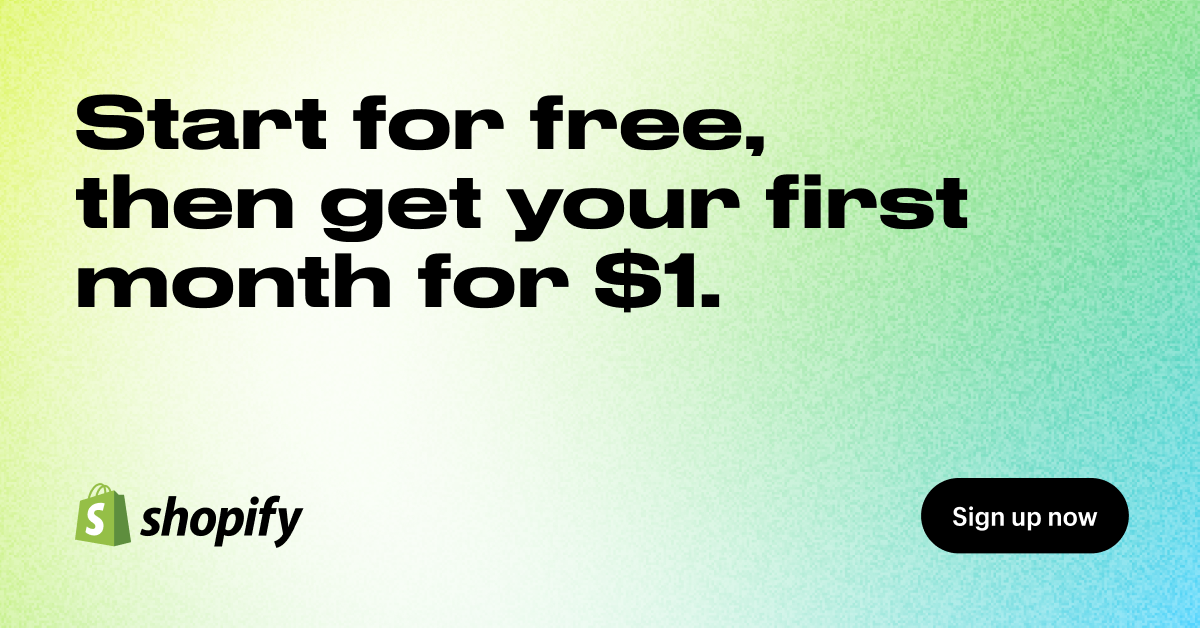Although Volusion has been here since 1999, the company currently powers way lesser stores than Shopify (founded in 2006). Volusion’s about 15,000 and Shopify’s over 700,000. Shopify is also more searched.
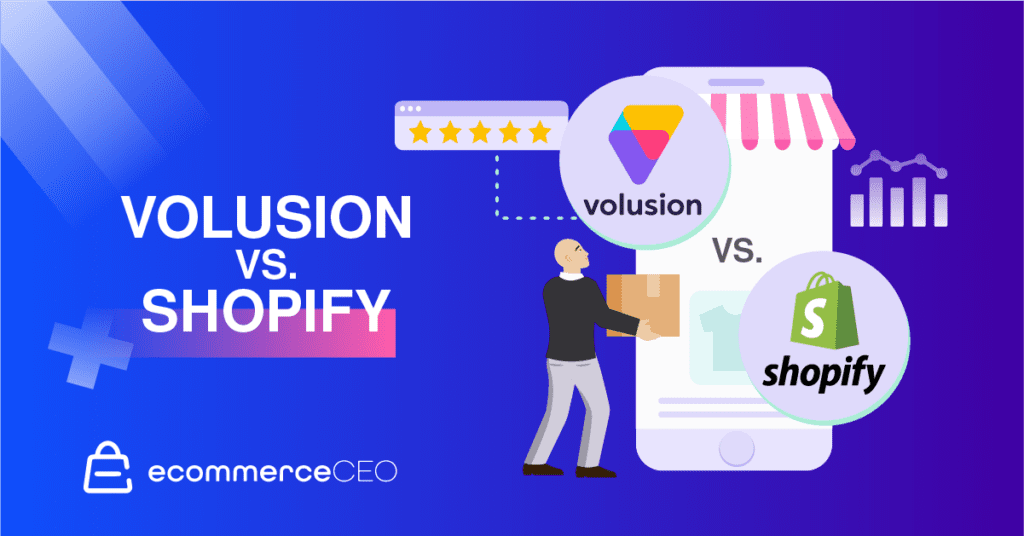
Does that mean Shopify’s better or is it just better marketing? When it comes down to Volusion vs Shopify, it’s not just about lower prices or having a store that looks like no one else’s. I’ve spent $30k on a complex design when a stock template (that’s cheaper) converted better.
I’ve saved you the headache by comparing the key differences between both that will tilt the scales.
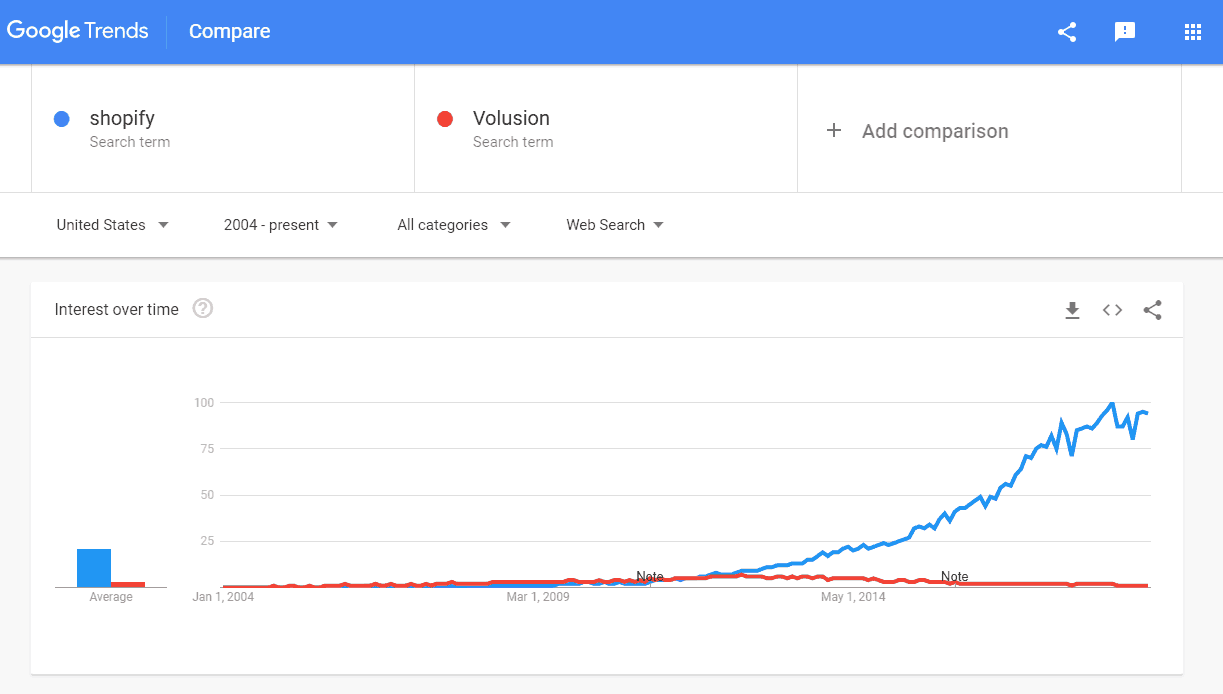
Choosing Between Volusion And Shopify
Volusion
Volusion is one of the oldest and leading hosted ecommerce solutions. It fell behind BigCommerce and Shopify, but in the past months, it has seen lots of improvement both in selling features and offering unlimited bandwidth. Overall, it’s a solid platform and offers a cheaper alternative for subscription ecommerce over Shopify.
It’s solid if you want to dropship. It’s not for print on demand; Squarespace is better off for that. Not for up/cross-selling products and you pay more for Amazon integration than Shopify.
Pros
- Great onboarding and help center
- Built-in Subscription/Recurring Payments
- SMB Friendly
- No transaction fees
- Deal of the day
Cons
- You can’t sell automatic digital downloads
- Lacks up/cross-selling features
- One of the slower SaaS platforms
- No built-in blog feature
Shopify
Shopify is a renowned ecommerce store builder with an excellent set of selling features and extensive marketing options. Where Volusion fails in up/cross-selling options, Shopify doesn’t. Also, it is excellent at Dropshipping, and it supports more dropshipping apps than Volusion.
It charges transaction fees if you don’t use its native payment gateway. Although it has a built-in blog unlike Volusion, it’s not the best for SEO. Neither is Volusion anyway. You’re better off with BigCommerce or WooCommerce here.
Pros
- Lighting fast load time.
- Lots of certified partners to help you.
- 1-Click selling
- Options for up/cross-selling
Cons
- Transaction fees
- Rated poorly in SEO in consecutive studies
- Apps can add up and become costly
What To Look For In A Hosted Ecommerce Platform
Picking one out of the many hosted ecommerce platforms can be daunting. Unlike self-hosted platforms where how easy it is to use them or your web host sort of smoothens your decision process. Many hosted platforms offer similar features for a similar price range.
So, what exactly should you look at to narrow your options?
The first thing to consider is what you want to do. Do you want to make a few bucks dropshipping few products or are you planning on beginning a big branded ecommerce enterprise? Is it branded products for a small business? Are you going to use a subscription model? Is affiliate marketing involved?
The reason why those are important is that online store builders have their strengths. Shopify is well known as the dropshipping powerhouse. Large ecommerce businesses are better off with BigCommerce. Subscription businesses can take Volusion. Print on demand works well on Squarespace and so on. Of course, depending on your business size, you might not stick with these suggestions.
Then, your skill level matters, especially if you are going to build your store without the help of a web designer or manage it without the Volusion or Shopify expert.
Also, pricing matters. Some hosted shopping carts are ridiculously expensive. So, you have to check if the price fit your budget and the features you seek. The essential features that ecommerce businesses need. Some more than others:
- Zoomable product images
- Product reviews and ratings
- Robust blog features
- SSL certificate
- Site search
- Coupons and discounts
- SEO tools
- Product import/export capability
- Fast loading speed
- Product options
- Mobile-ready design
- Marketing options
Pricing & Value: Compare Shopify And Volusion
Shopify and Volusion offer similar subscription options. To start with both offer free trials without credit card details.
Shopify’s pricing plans are as follows:
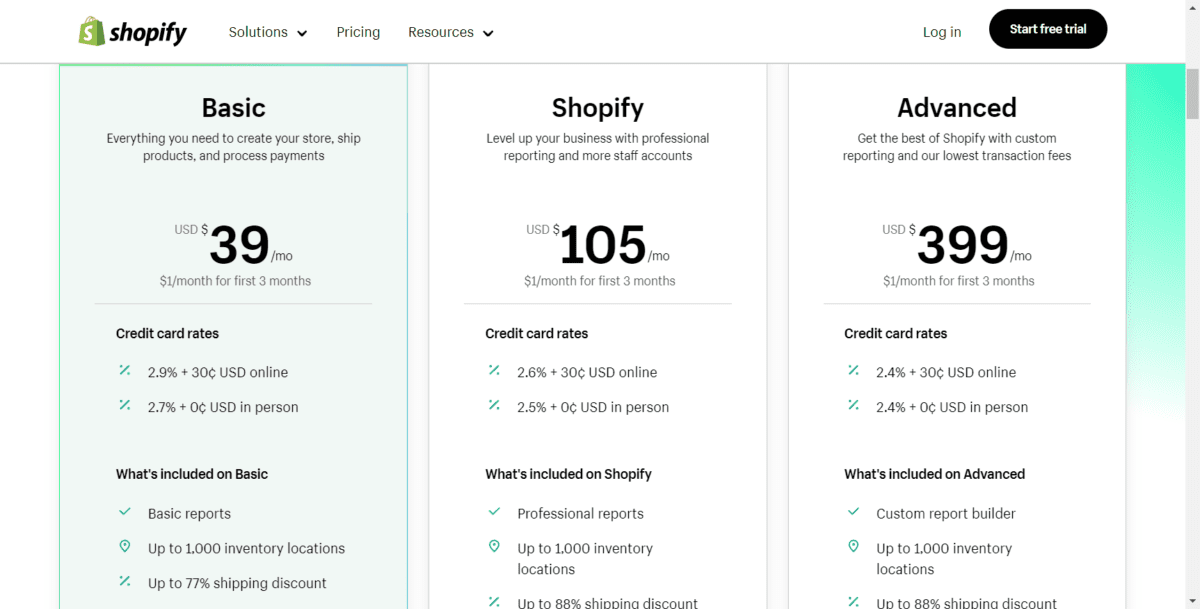
Asides from Shopify’s Basic Shopify ($39), Shopify ($105), and Advanced Shopify ($399) plans, there are also two other options:
- Starter ($5)
- Shopify Plus (custom pricing)
If you only wanted to use the Shopify buy button or sell on Facebook, then you can use the Lite option. It’s not a full ecommerce solution.
Volusion offers similar pricing options:
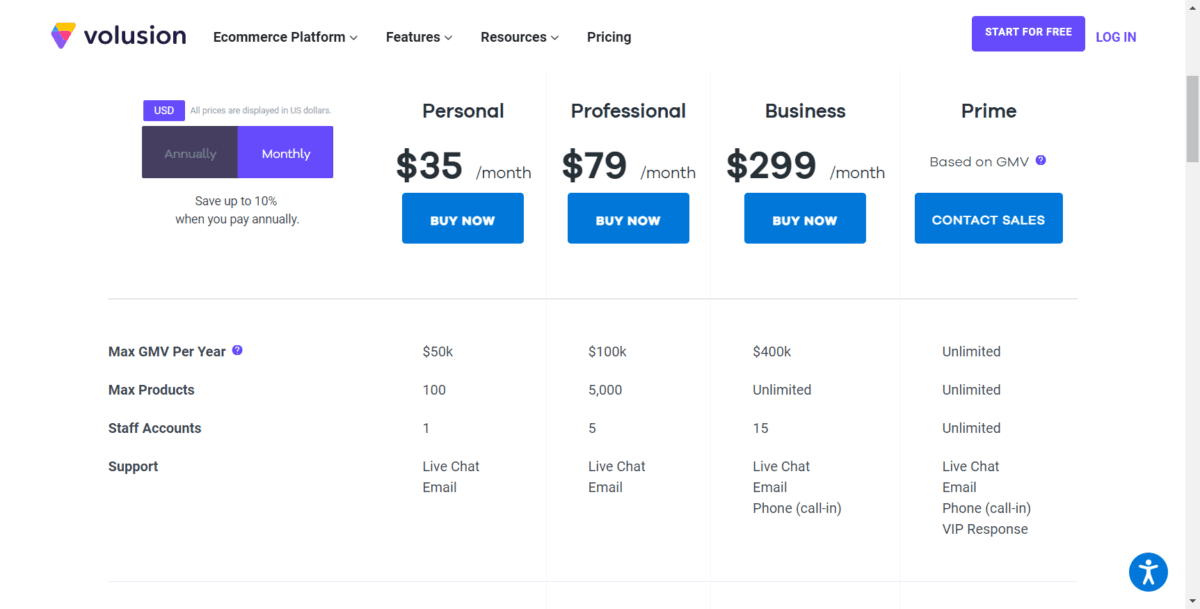
- Personal – $35
- Professional – $79
- Business – $299
- Prime – Custom
As you can see, recent pricing changes make Shopify more expensive. However, there’s a difference in some areas.
To start with, I don’t like that Shopify charges a transaction fee if you don’t use Shopify Payments. The payment gateway is not available in every country that Shopify is, and you’re restricted with the up/cross-selling apps you can use because if you set up certain apps, you can’t use that gateway. Plus some subscription apps charge transaction fees too.
There’s also the issue of apps on Shopify that can add up and become costly. You might need many of them.
Although Volusion has its own native gateway, the only catch is that using it means lower credit card processing fees than using other gateways.
But then, Volusion restricts the number of products and revenue you get on each plan. On the personal plan, you can sell only up to 100 products and make at most $50k per year. On Shopify, you can sell unlimited products and make as much as you want on the Basic Shopify plan.
Also, despite both platforms offering the same pricing, Shopify offers more features for the prices. For those that it doesn’t build in, there are paid apps. For 1-click upselling, up/cross-selling, and subscriptions, pay attention to the prices:
- Bold Upsells from $9.99/month
- Cross Sell Recommended Products at $19.99/month
- Subscriptions by ReCharge for $39.99/month
Volusion offers built-in features for collecting recurring payments. There are no options for up/cross-selling, or one-click upsells.
Winner = Tie
The prices are identical, but the value you get depends on what you’re looking for. If you’re selling subscriptions, Volusion is more worth it, but Shopify offers more options for increasing order value. But then, the price you pay for all those might go past your budget. Plus the extra features might not matter to you at all.
Head To Head: Performance
The performance of your ecommerce cart will determine if people find you on a search engine and stay on your site when they get there or if your site is too slow for their patience.
See the comparison:
| Platform | Performance | Load Time | Mobile Speed | Desktop Speed | Avg SEO Traffic |
|---|---|---|---|---|---|
| Shopify | 3.9 | 1.3 | 63 | 75 | 11717 |
| Sellfy | 3.1 | 1.4 | 46.8 | 72 | 134 |
| Zyro | 3.3 | 2.1 | 51 | 89 | 128 |
| Nexcess StoreBuilder | 4.0 | 1.93 | 53 | 72 | 58,645 |
| ShopWired | 4.3 | 1.38 | 56 | 80 | 717 |
| Pixpa | 2.3 | 1.6 | 22.66 | 65.5 | 72 |
| Freewebstore | 3.5 | 1.89 | 53 | 79 | 927 |
| Ecwid | 3.5 | 5.0 | 50 | 82 | 15,517 |
| Square Online | 2.8 | 2.03 | 1.0 | 3.0 | 65,317 |
| BigCommerce | 4.5 | 2.2 | 63 | 80 | 33626 |
| Woocommerce | 3.1 | 3.4 | 42 | 52 | 72968 |
| Shift4Shop | 3.0 | 2.8 | 50 | 58 | 9703 |
| Volusion | 2.9 | 3.5 | 48 | 56 | 15779 |
| Adobe Commerce | 2.8 | 4.8 | 39 | 43 | 19408 |
| Prestashop | 2.9 | 4.62 | 50 | 52 | 33851 |
| SquareSpace | 3.5 | 3.5 | 42 | 63 | 5678 |
| Wix | 3.9 | 3.2 | 69 | 81 | 543 |
| Weebly | 2.6 | 3 | 49 | 59 | 186 |
Load Time And PageSpeed
Shopify has lighting fast load time. Amongst the top ecommerce platforms, it loads the fastest. The average load time is 3.2 seconds, and Shopify sites tend to load in 1.3 seconds. Volusion though is slower than that. My research showed that sites on Volusion tend to load in 3.5 seconds.
I checked in on Google PageSpeed. Volusion is quite slow for a hosted shopping cart. Here, Shopify does way better.
SEO
Both of them have solid product page SEO. You can customize your page title and meta descriptions. Both automatically generate sitemap.xml.
When you change your URL, search engines have to know, else you’ll lose your previous page rank efforts. Both offer 301 redirects. With Shopify, you can create a new path in your navigation under online store. On Volusion, you take care of that in the redirects manager section.
Although both have problems with editing URLs, Volusion’s is worse than Shopify’s. On Shopify, you can edit everything, but it keeps some strings – /category/ for example – in your URL. Those are keywords at least. Volusion leaves variables.
URLs are https://www.examplestore.com/cat125/?productid=5678
You can edit that by switching on search-friendly URL setting and tweaking some things. But then, you end up with:
https://www.examplestore.com/v-neck-shirt_p/lh257.htm
You could edit the product code – “lh257” – but you can’t take it out. You also cannot take out the “_p/” and “.htm.” It’s the same thing for articles, there’s “_a” and “/<articleid#>.htm” which you can’t change or take out.
Blogging
Blogging is effective for pulling in your target audience. Customers feel more inclined when you’re not always obviously trying to sell them something. It’s also good for receiving inbound links as well because there are more chances of getting links to one of your relevant blogs than a product page.
From the table above, you can see that Volusion scores better in average organic traffic, but none of the two reach the average score. The reason why Volusion does better is probably that most stores on it use third-party software to integrate blogging thus using the features offered outside.
Some Volusion site owners use “Articles” to create blog posts. There’s a massive problem with this though. It doesn’t act like a blog post plus you can’t collect comments on it. It’s best for FAQs and pages.
Shopify does offer a built-in blog, but it’s basic. You might need to install an app if you want to customize the look and all.
Winner = Shopify
I chose Shopify because of the load time, speed, and better SEO features.
Best Features: Volusion Or Shopify?
Volusion misses ratings & reviews and abandoned cart recovery on the Personal plan. So, you’ll need to pay at least $79 to access those features. Shopify offers those on the $29 plan.
However, Volusion offers more built-in features than Shopify. For example, you can sell personalized products without having to pay more than your monthly Volusion subscription, but on Shopify, you’ll need to pay for an app along with your subscription.
However, some of Volusion’s built-in features like reward points and subscriptions might not matter to you. Whereas the missing ones will, for examples 1-click upsells.
Shopify has some nice features built-in including abandoned cart and real-time shipping rates. You’ll need to pay for many of its features, like a robust product search feature, subscription, reward points, and 1-click upsells.
The good thing is that the features are at least available through apps. But Volusion’s app store has very few apps, and none take care of the up/cross-selling and 1-click upsells feature that it misses.
If you are looking forward to creating affiliate programs, you might prefer Volusion. Affiliates can sign up on your website, and you can even send an email to a specific contact/affiliate straight from your Volusion dashboard. That feature is built-in, unlike Shopify where you need to buy an app.
For more details on Shopify features, see the table below:
Shopify Features and Plans
See that of Volusion:
Volusion Features and Plans
Winner = Tie
Although Volusion offers more built-in features than Shopify, some of those features that it misses, like the upselling are vital. On the other hand, on Shopify, you’ll be paying to have some of the features that Volusion has built-in. In this case, it’s about what your business is about.
Shopify Vs Volusion: Integrations
You have access to thousands of integrations on Shopify. For the sake of this review, I’ll concentrate on 16 integrations.
To start with, you’ll need marketing automation tools. Volusion provides a free MailChimp integration. For Klaviyo, you’ll need to get a custom script from Klaviyo to insert in your Volusion store. If you’d rather use Drip or Active Campaign, your only option is Zapier. Although it connects both, it’s not a full integration, so you’ll miss out on some features. Shopify integrates with all of them through apps in the Shopify store.
I mentioned above that Volusion is not for print on demand businesses. While Shopify and POD apps (PrintFul & Printify) offer integrations, there’s nothing like that on Volusion. Again, you can only get that with Zapier.
Both of them recognize that some merchants need 2-way sync with other channels. They offer built-in integration options with Amazon, eBay, Google product feed, and social media. Beware though that your ability to use them depends on your plan. On Volusion for example, if you are on the personal plan, you can’t use the Amazon and eBay sync.
The part that I hate in Volusion is blogging. Although you can connect a WordPress blog, you’ll have to go through subdomain, CNAME, and other settings that will take you a while to figure out. Also, you can’t do it on a free .wordpress.com account. So, you’ll have to pay to host .org or pay to .com. It’s a mess. Shopify at least offers a built-in blog.
Volusion’s limited app store doesn’t offer integration for FBA or Alibaba. So, if you ship with Amazon or get your products from Alibaba, you’re better off with Shopify. There are paid apps to integrate those.
Look at my full list of integrations for Volusion:
Volusion Integrations and Plans
Here’s Shopify:
Shopify Integrations and Plans
Winner = Shopify
Shopify offers more integrations. Most are either built-in or with a free app.
Head To Head: Design
You need a strong design game if you don’t want to keep customers away. Clean, modern, and mobile-friendly designs work over messy unresponsive ones.
Both builders have nice looking themes, but Shopify has an edge with modern designs. Most of the Volusion sites that I saw look dated.
I also checked Google’s Mobile UX score. Shopify’s themes performed better too. The average score is 95.2/100. Shopify got 97/100 and Volusion is at a 92.
Volusion has 11 free themes and 45 premium themes.
Shopify, on the other hand, offers more options with 10 free themes and 61 premium themes.
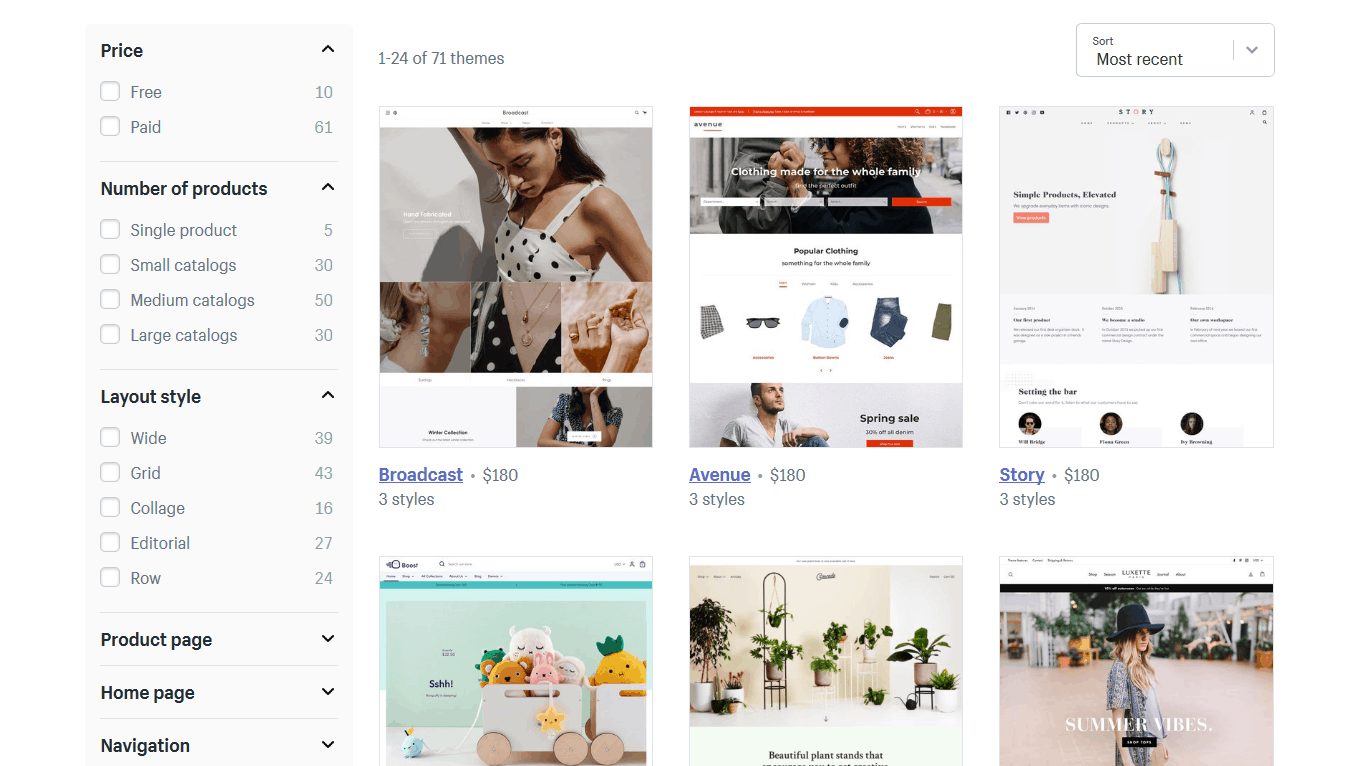
On Shopify, you can get a theme for $140 up to $180. The themes that are for $140 are not bad so you can save up to $40 compared to Volusion where every premium theme is $180. Both platforms offer mobile responsive themes, so they look good on any screen size.
If you’re not satisfied with the themes in the store, you can get a Volusion or Shopify theme developer to build a custom template for you.
| Platform | Design & Themes | Visual Design | Mobile UX | Cost Of Premium Themes | # of Free Themes |
|---|---|---|---|---|---|
| Shopify | 4.0 | 5.0 | 97 | $140 | 9 |
| Sellfy | 5.0 | 5 | 93 | $0 | 5 |
| Zyro | 5.0 | 5.0 | 92 | $0 | 50+ |
| Nexcess StoreBuilder | 4.3 | 3.0 | 94 | $20-$100 | 4 |
| ShopWired | 4.3 | 5 | 93 | $3495+ | 20 |
| Pixpa | 4.3 | 5 | 94 | 0 | 131 |
| Freewebstore | 4.3 | 5 | 92 | 0 | 100+ |
| Ecwid | 4.3 | 5.0 | 93 | $60 | 1 |
| Square Online | 3.7 | 5.0 | 92 | $0 | 1 |
| BigCommerce | 3.8 | 5.0 | 94 | $150 | 12 |
| Woocommerce | 4.3 | 3.0 | 97 | $39 | 1000+ |
| Shift4Shop | 4.3 | 4.0 | 95 | $200+ | 50+ |
| Volusion | 3.7 | 4 | 92 | $180 | 18 |
| Adobe Commerce | 3.7 | 5.0 | 5 | $300+ | 1 |
| Prestashop | 3.2 | 4 | 94 | $29+ | 0 |
| SquareSpace | 4.3 | 5.0 | 5 | 100.00% | 14 |
| Wix | 4.7 | 5.0 | 92 | 0 | 72 |
| Weebly | 4.3 | 5 | 97 | $45 | 15 |
Winner = Shopify
Shopify has an edge here because of the higher mobile UX score, more modern designs, and the availability of cheaper themes.
Volusion Vs Shopify: Ease Of Use
Both platforms are easy to use. In the past, it was hell trying to create simple things like pages on Volusion, but with their recent redesign, everything is outlined on the vertical navigation area. You can get an automatically generated about us and contact us page.
You can easily contact your store advisor from your dashboard, and there’s a checklist for setting up your store. The redesign upped Volusion big time. But it does a lot of handholding. For example, if you want to add a discount, it’s a whole page of questions. After a while, that might get annoying.
Also, there’s no drag and drop builder or nice editor. When it comes to modifying your page content, adding a new section that doesn’t come with the theme is hell. That’s not so on Shopify – although there’s no drag and drop, it’s easier to add section to pages and design your store.
Nevertheless, both are great for first-timers with little to no technical skill or experience. My ease of use rating though is not only based on your being able to use it if you are not an experienced user.
I also looked at their customer support options. Volusion offers 24/7 phone, live chat, and email support, but you can only use the phone support if you’re on the Professional plan ($79) or higher. Shopify’s phone support is available on all plans.
If you want to DIY without calling or chatting up the customer service, the Community should help you. Shopify’s community is bigger than Volusion’s so you have much higher chances of getting the answers that you seek on Shopify’s.
Look at the rating table:
| Platform | Ease of Use | Phone Support | 24/7 Support | Chat Support | Community Rating | # of Apps/ Plugins |
|---|---|---|---|---|---|---|
| Shopify | 4.9 | Yes | Yes | Yes | 5 | 5,000 |
| Sellfy | 3.5 | No | Yes | No | 4 | 4 |
| Zyro | 3.7 | No | Yes | Yes | 4.7 | 30 |
| Nexcess StoreBuilder | 4.5 | Yes | Yes | Yes | 3.6 | 50,000+ |
| ShopWired | 4.5 | No | No | Yes | 4.9 | 72 |
| Pixpa | 3.7 | Yes | No | Yes | 4.7 | 103 |
| Freewebstore | 3.4 | No | No | Yes | None | 25+ |
| Ecwid | 3.6 | 5.0 | 1.0 | 5.0 | 4.7 | 100+ |
| Square Online | 4.0 | 5.0 | 1.0 | 5.0 | 4.2 | 25+ |
| BigCommerce | 4.8 | Yes | Yes | Yes | 4.0 | 1000 |
| Woocommerce | 3.3 | No | No | Yes | 4.0 | 250+ |
| Shift4Shop | 4.3 | Yes | Yes | Yes | 3.0 | ~250 |
| Volusion | 4.1 | Yes | Yes | Yes | 2 | ~20 |
| Adobe Commerce | 2.2 | No | No | No | 4 | 3000+ |
| Prestashop | 2.9 | Yes | No | No | 3 | 3000+ |
| SquareSpace | 3.8 | No | Yes | Yes | 3.0 | 10+ |
| Wix | 4.2 | Yes | Yes | No | 4.5 | 700 |
| Weebly | 3.6 | Yes | No | Yes | 2 | ~350 |
Winner = Shopify
Shopify’s dashboard and design interface are relatively easier to use. Also, you have phone support on all plans unlike Volusion’s, and a bigger community with more articles and people.
Which One Should You Choose
It all comes down to this. You’ve seen the features, prices, design, ease of use, and everything that’s essential for most online businesses to make a decision. If you’re currently using any of the builders or you have concerns that I missed in the article, hit me up at the comment section.
Why Choose Volusion Over Shopify
Choose Volusion:
- if you’re going to create an affiliate program or take recurring payments (subscription business): Volusion offers a built-in solution
- If you manufacture or wholesale in a boring niche: Volusion caters to those selling products that are not as responsive as fashion, car accessories and other more technical products.
- If your business falls under the SMB category: Volusion works for Small and medium-sized businesses; it has built its model around these ones.
Why Choose Shopify Over Volusion
Go with Shopify for these reasons:
- If you plan on dropshipping using not only US-based suppliers: Shopify offers more dropshipping apps that cover suppliers outside the US. Asia-based suppliers for example.
- If you’re a total beginner: the issues with navigating some parts of Volusion and setting up things like a full blog are my concerns here
- If you want more features or want to sell on many channels: Shopify offers more features and multi-channel selling 2-way sync.
That’s it for Shopify and Volusion. Both platforms are ideal for limited business models, unlike BigCommerce for example. Volusion’s attempt to branch out a bit into dropshipping hasn’t worked due to its limited options. Shopify has that business model covered, but affiliate marketers and subscription e-commerce are better off elsewhere.


